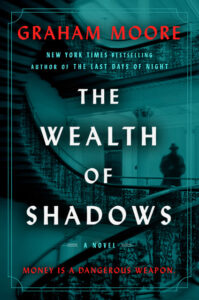I Went There to Exploit the Property Values
Chapter One of The Challenge of Charity

In 1996, six years after the end of the US-backed Contra war, the overthrow of Anastasio Somoza by the Sandinista Party (led by Daniel Ortego), and the democratic election of President Violeta Chamorro, I flew down to Nicaragua.
At that time, Nicaragua had a per capita GDP of $908, the lowest in Central America. It ranked among the three poorest countries in the Western Hemisphere, shoulder to shoulder with Haiti.
Nicaragua was in desperate need of financial aid, but I wasn’t there on a humanitarian mission. I was there to buy a large parcel of beachfront property cheaply, divide it into lots, and sell them to our customers at a tremendous profit.
The Opportunity

My mission was funded by a business I was partnering with, a Baltimore-based publisher of newsletters and magazines. Several years earlier, I had been recruited from an easy but unchallenging retirement to help grow the company’s profits. At the time, the business had annual revenues of only $8 million. (I was retired from partnering in a similar business whose revenues I had helped grow from $1 million to more than a $100 million in seven years.)
The company was publishing about half a dozen investment newsletters and a magazine-styled monthly publication called International Living, which provided information and advice to Americans interested in retiring or owning second homes overseas.
For years, International Living had been featuring stories and sponsoring tours of Mexico, Panama, Costa Rica, Belize, Mexico, and the Caribbean. These were all countries that its readers felt good about traveling to.
Nicaragua had not been featured for a long time. Not only because of its bellicose past but also because it had tumbled from being one of the richest Central American countries to the poorest.
A benefit of Nicaragua’s dire economic status was that the government at the time was a free market, pro-growth administration. And despite the political violence that had been front page news in the US, it had quickly returned to being a low-crime, peaceful, and even welcoming nation.
But it was that shocking level of poverty that made buying property there incredibly cheap. So, it came as no surprise to me that the editors of International Living ranked it that year as their “best buy.” They reported that its climate was tropical, its people were friendly, its geography was beautiful, and everything was very, very inexpensive.
To supplement subscription revenues, International Living had been sponsoring “get acquainted” tours for subscribers who were intrigued by the arresting photos of the country and tempted by the low prices. They wanted to see for themselves if the magazine’s praise was merited.
The idea of selling tours to International Living subscribers seemed sensible to me. But when I looked at the P&Ls, I could see that we had underestimated the costs involved in transporting and housing them in a style that was even remotely up to US standards.
And there was another problem. When members of the tours expressed an interest in moving to Nicaragua, their International Living hosts introduced them to local real estate brokers, some of whom were selling them properties with problematic titles and leaving our subscribers, quite understandably, upset.
The answer, it seemed to me, was to do our own real estate brokering, which we could properly vet with local lawyers. My partners agreed and the strategy worked. As the months passed, we became more confident with conducting business down there and began talking about a potentially bigger opportunity.
The idea we had was to find large tracts of land on the scenic Pacific coast, divide those tracts into lots, and then sell them at prices that would look dirt cheap to US and Canadian buyers and still provide us with sizeable profit margins.
A Mission and an Adventure
So that’s why I was in Nicaragua. Not to save the country, but to exploit it.
Because US business and investment in Nicaragua had dried up after the revolution and had not yet recovered (most Americans believed the country was still in turmoil), our interest was welcomed both by the country’s department of tourism and the US State Department, which was looking to promote US business there.
As a result, I spent my first night in Managua, not in a hotel, but at the home of Lino Gutiérrez, the US Ambassador to Nicaragua. The only time before then that I’d been to the home of an ambassador was when I was teaching English Literature at the University of Chad as a Peace Corps volunteer and, along with the other American volunteers and our wives, was invited to dinner at the US Ambassador’s residence. And now, 20 years later, I felt, once again, flattered to have been invited and excited to think that I might be doing something that merited the invitation.
The next day, I was picked up by AG, a local businessman who had oceanfront property for sale. On our three-hour drive down the Pacific Coast Highway, he filled me in on what he thought I should know about the local area.
He told me that Nicaragua was a beautiful country, which – although I was seeing only a sliver of it – was already obvious. He told me that the Nicaraguan culture was complex. It wasn’t just fighting and farming. And although the revolution had fostered its share of violence, the very fact that peace and democracy had been restored after 10 years was evidence of the generally compliant and agreeable nature of its people. He told me that Nicaragua was rich in gold and other minerals, and that before the revolution – even with the worst of Somoza’s tyrannies – it had, compared to its neighbors, a relatively stable and growing economy. “People were poor,” he said. “But nobody was starving.”
An Amazing Grace
The property he showed me was owned by his family – acres upon acres of rolling hills, intersected by a small river and including five coral-colored beaches, one more beautiful than the other. The first beach he showed me would have been enough to seal my interest in the property, but there were four more to be seen.
I spent the rest of the day with AG, exploring it on horseback as he led me up and down the cow paths that crisscrossed the property, moving through dark forests (home to howler monkeys) and sunlit glades, past cliffs and ridges and lush green valleys.
Looking out over the landscape, it was easy for me to imagine estate homes perched upon the hillsides with glorious views of the sea.
This was the Eden my partners and I had been looking for.
The entire property consisted of 1,700 acres. A similar property in the US at the time, in California, say, which it resembled, would have gone for at least $300 million.
We bought the first 1,000 acres immediately and the remaining 700 acres a year later, after we had proven to ourselves that we could sell our concept for the property to our subscribers. And what did we pay for it? I’ll say this: When AG mentioned the price to me, I didn’t even try to bargain. It was less than I had recently paid for a one-story bungalow on a quarter-acre lot across the road from the beach in Delray Beach, Florida.
The decision was, as they say, a no-brainer.
A Business Lesson
As publishers, my partners and I knew next to nothing about real estate development and absolutely nothing about selling property in Nicaragua to Americans.
In the months that followed, we discovered that just the cost of infrastructure (carving out roads, bringing in water, electricity, etc.) was going to be about five times the cost of the land.
But we didn’t know that when we signed the purchase agreement. We made the deal. And as part of it, AG wanted in, so he became our sixth partner.
We were excited. We felt smart. And lucky. But, as I said, we had no idea what we were getting ourselves into.
Lesson #1: When you begin a business that is new to you, know that some of the most important truths about succeeding in that business are hidden from you at the start – even if you have “studied the market” in advance. Success often depends on discovering those secrets before you run out of money, patience, and time.
(Look for Chapter 2 in next month’s issue…)
An Astronomical Threat to Your Wealth!
From The 7 Natural Laws of Wealth Acquisition

About 20-something years ago, BB and I were in Europe meeting with several entrepreneurs with whom we hoped to jointly launch European offices for the publications we were selling in the United States.
Since BB and I had teamed up 10 years earlier, the business had grown substantially. We were feeling good about that and positive about the future. So positive, in fact, that BB decided, almost impulsively, that the company should buy a chateau in France that we could use when we were there.
The next thing I knew, we were in the countryside of the Dordogne region, shopping for chateaux. It was enthralling to think that I, having grown up in a working-class neighborhood on Long Island, New York, was here on a business trip in France buying a castle.
It was a beautiful day when we set out with a local broker, which probably made us feel that much better about what we were doing and diminished any second thoughts we might have had about its financial sense.
By the end of the day, we had seen half a dozen properties. And that night, at dinner, we talked about our preferences. I had fallen in love with a newly refurbished chateau that looked like a miniature Versailles. He had fallen in love with a gothic castle that had been neglected for decades.
The benefit of “my” chateau, I argued, was that it was ready to furnish and use. BB, a weekend handyman, saw its condition as a deficit. He didn’t say so directly, but I’m pretty sure he was already daydreaming about how he could fix up “his” castle. The deciding factor turned out to be the price. We could acquire the castle for about a million dollars, while the chateau cost four times that much.
So, we went with the castle. And soon thereafter, BB was working on notes and drawings that he could use to oversee its reconstruction.
He soon discovered that the repairs and improvements he wanted to make had to be approved by the local historical preservation board. And that is when he recognized that the job was going to be more complicated and perhaps more expensive than we had imagined. So, he did the right thing and bought the place from the company.
Over the next 10 years, he improved all of the buildings on the property to the point where his family could live comfortably in them or, when they weren’t there, rent them out.
But the cost of the renovation, in terms of time, was enormous. And the cost in terms of total dollars spent on it ended up being as much as or greater than “my” chateau would have been.
BB’s struggle to overcome the erosion of that property illustrates one of the most important concepts in business, investment, and wealth building.
Understanding Entropy Is Understanding Everything
In physics, entropy is associated with randomness or uncertainty. In the natural world, it manifests as the inevitability of a decline into disorder. Or, as Paul Simon said in one of his songs, “Everything put together sooner or later falls apart.”
Monuments are built and crumble. Empires are won and lost. Cultural fads surge and then taper off. Human beings grow strong and then weaken and die.
The entire universe and everything in it is subject to entropy. And that includes business ventures and everything we human beings do to become successful in life and leave the world with something of value after we die.
You book a room in a hotel that looks brand-new. You arrive and are unpleasantly surprised to discover that the rugs are worn and the bathroom fixtures are old.
You want to learn how to play the guitar. You buy one and enroll in an online course. For the next several weeks, you spend all your spare time on this new and exciting hobby. Then, several months later, something happens. Something work-related or family-related or financial or purely accidental. It could be anything. But it takes all your attention. And then, almost without noticing, a year passes and you realize that you haven’t picked up your guitar once.
Or something else happens. Something seemingly inconsequential but disturbing. You get a flat tire. Your pen runs out of ink. You pour yourself a glass of milk, take a gulp, and spit it out because it’s sour.
Things go bad. Things wear down. Things fall apart.
There is a term in business that parallels entropy. It’s called “incremental degradation.”
Incremental degradation is what often happens when, for example, the leadership team tries to increase the bottom line by indiscriminately cutting costs.
The most common story told to illustrate this point is about an imagined food product containing, say, 27 ingredients. To reduce the cost of producing this product, the team decides to eliminate three of them and see if customers notice.
It turns out that they don’t notice. So, the team eliminates another three ingredients. Once again, they don’t seem to notice. But the third time the team tries to boost the bottom line by reducing the number of ingredients in the product, customers do notice.
Almost overnight, sales drop dramatically. Not by a small fraction but by 50% or more.
Because of how gradually the ingredients were withdrawn, the steepness of the drop doesn’t seem logical. But studies done on this phenomenon have proven that is exactly what happens. What’s more, they’ve proven that once customers have abandoned a once-favorite food product, the chances of getting them back – even if an attempt is made to add back all the original ingredients – is very small.
Understand Negentropy – the Opposite of Entropy – and Harness a Universal Force for Repair & Growth
Scientists and mathematicians use the term “negentropy” (a portmanteau of “negative” and “entropy”) to refer to the difference between the energy and the potential energy in a system – which translates to efforts that can be made to keep things from falling apart.
When I consult with senior executives, incremental degradation is one of the first “laws” I teach them. I explain why the popular aphorism “If it ain’t broken don’t fix it” is a recipe for eventual failure. I then encourage them to employ a contrary practice – what I call “incremental augmentation.” Which is, very simply, the continual improvement of the quality of their product or service.
I look for examples of incremental augmentation wherever I go.
When I’m staying at a particularly nice hotel and they give me a welcome gift when I check in… or I’m impressed by a creative flower arrangement in my room… or by a clever design for a menu at the hotel restaurant… I make note of it and take a photo of it and send it to the director of Rancho Santana, our five-star resort in Nicaragua.
When I visit a botanical garden, I’m always on the lookout for something, anything, that I like and that we don’t have in our garden, Paradise Palms, in Delray Beach. When I see it, I make note of it and take a photo of it and send it to our property manager.
There are very few days that have passed since I started working in the direct-response publishing industry 40+ years ago that I’m not scanning my competitors’ publications and advertisements, looking for something that I can send along to people that can somehow make good use of it.
And in that time, I’ve discovered a few things worth mentioning.
1. Incremental augmentation applies to every sort of business and every sort of institution and organization – public, private, or non-profit – that I’ve tried it with. And it applies to every sort of product or service I’ve used it for.
2. When I first began employing this tactic – and it was years before I had heard of incremental degradation or had given incremental augmentation a name – I assumed that sooner or later I would exhaust all possible ideas for small improvements and enhancements. What I discovered was quite the opposite. The more ideas I found, the more new ideas I noticed or, in some cases, invented by putting two disparate ones together in some novel way.
3. Incremental augmentation is not only a limitless resource for negating the thousands of detrimental forces pushing against your success (many of which may be invisible to you), its power grows exponentially… just as the negative power of incremental degradation does. In other words, it has the power to suddenly grow your business by leaps and bounds when the market comes to understand how much better your products and services are than those of the competition.
Negentropy and Personal Wealth Building
When I began to make more money than I needed to support my family, I also began to explore passive and semi-passive opportunities to increase my wealth.
These began with investments in stocks and bonds, then moved into rental real estate, then into extending mortgages and other private lending businesses, then into taking partial ownership of certain kinds of start-up companies (those that I understood and could control), and then finally into fun wealth-building activities such as collecting investment-grade art.
I’ve given you a brief account of how incremental augmentation helped me extend the lifespan of the businesses I’ve owned and run, while also expanding their value for my customers and shareholders. But I’ve learned that the same concept, applied creatively, works with the more general objective of building personal wealth.
One example: When, in or about 2010, I developed (with some expert guidance) a stock investing strategy based on some of Warren Buffett’s experience, I recognized that to equal what Buffett had done in the past, I had to tweak his strategy to reflect the current realities of the stock market. I did it by including a tranche of fast-growing social media businesses in my portfolio – but I selected them, with the help of my advisors, to reflect Buffett’s core concepts of market domination and “moats.” I also tweaked my strategy by replacing dividend reinvestment plans (DRIPs) with a reinvestment strategy based on value investing, which I discovered by simply understanding DRIPs better and more deeply than I had before.
These incremental augmentations of a strategy that had already been proven to work resulted in the Legacy Portfolio, which is now almost 15 years old and has outperformed the market, both in terms of higher ROIs and considerably less volatility.
I used the same approach in my real estate investing. When I began buying small, single-family houses, I followed the rules of that industry. But I was always looking for ways to earn better ROIs by improving the deals I made, the properties themselves, and the quality of service provided to renters – which paved the way for gradually higher rent increases and fewer maintenance and repair costs. I did the same thing when I began investing in larger commercial and residential and resort properties.
On another level, I put this idea to work in my general approach to wealth building by consciously developing multiple streams of income through half a dozen market sectors, with the goal of eventually generating in each one of those sectors enough to cover all my future financial needs even if all the others failed for reasons I could not control or understand.
That, too, I’m happy to tell you, worked. Not with every one of them. And some worked better than others. But three hit the mark, and the others are still sound and profitable.
I see this concept of developing multiple income streams as a conscious exercise in negentropy. It is grounded in the very real fact that entropy affects every business and investment asset class. And if you try to pretend otherwise – that your one core source of income will always be there for you – you may very well wake up one day and discover that you are getting poorer instead of richer!
For someone beginning their wealth-building journey, success can seem monumental and impossible. But really, it just needs to be built by one incremental augmentation at a time. Not by comparing how far you are from where you want to be but by focusing on the next small thing you can do.










